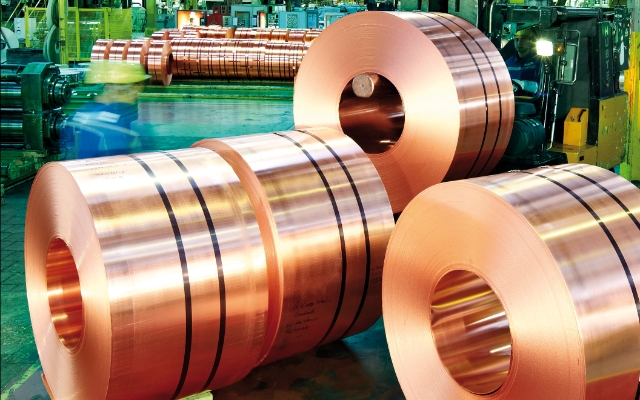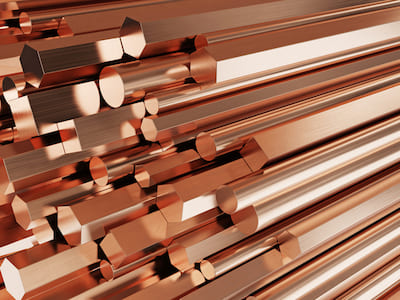From Art to Performance: The Many Applications of Distinct Copper Products
From Art to Performance: The Many Applications of Distinct Copper Products
Blog Article
Exploring the Diverse Applications of Copper Products in Modern Industries
From boosting the performance of electric systems to playing an important function in renewable power modern technologies, the versatility of copper is obvious. As markets significantly focus on advancement and sustainability, the varied applications of copper call for a closer evaluation, especially regarding their potential effect on future ecological practices and technological advancements.
Electrical Applications of Copper
Copper is a necessary material in the electric sector, representing about 60% of the overall demand for non-ferrous metals internationally - Copper Products. Its superior electric conductivity, which is nearly twice that of light weight aluminum, makes it the preferred selection for a vast range of electrical applications. From electrical wiring systems in residential and commercial structures to high-voltage power transmission lines, copper guarantees performance and dependability in electricity distribution
In enhancement to circuitry, copper is important to the manufacturing of electric elements such as electric motors, transformers, and generators. These components leverage copper's thermal conductivity and pliability, crucial for heat dissipation and efficient performance. Copper's resistance to deterioration improves the life-span and longevity of electrical systems, making it an economical solution in the lengthy term.
The growth of renewable power resources, such as solar and wind power, has actually further enhanced the need for copper in electrical applications. As markets shift towards sustainable power solutions, copper's function comes to be much more important. Overall, the adaptability and performance attributes of copper strengthen its standing as a keystone material within the electric field, driving development and performance throughout different applications.
Pipes and Piping Solutions
In modern-day pipes systems, the choice of materials considerably impacts both functionality and durability. Copper has become a preferred alternative due to its special buildings, including deterioration resistance and antimicrobial attributes. These characteristics make sure that copper piping stays safe and long lasting for carrying potable water, a vital consideration in household and commercial applications.
Among the essential benefits of copper in plumbing is its capacity to withstand high temperature levels and stress, making it suitable for a variety of applications, from warm water systems to heating and cooling down networks. In addition, copper's flexibility enables for less complicated installment in complex piping designs, minimizing the danger of leakages and failures.
One more noteworthy benefit is copper's lengthy life expectancy, often surpassing 50 years with correct upkeep. This durability not only decreases replacement expenses but also adds to sustainable practices by reducing waste. Copper's recyclability lines up with modern ecological standards, advertising a round economy within the pipes industry.
Copper in Renewable Energy
The convenience of copper extends beyond pipes applications, playing a crucial function in the renewable resource sector. Its excellent electric and thermal conductivity makes it a crucial product in the production and distribution of sustainable power resources, especially solar and wind power. In photovoltaic panels, copper is made use of in photovoltaic or pv cells and electrical wiring, facilitating efficient power conversion and transmission. Its resistance to rust ensures durable performance, which is critical for maximizing power output with time.

Furthermore, as the worldwide need for electric lorries (EVs) boosts, copper's role in battery systems and charging facilities ends up being even extra significant. The product's capability to conduct electricity successfully is essential to the efficiency of EV batteries, improving range and billing rate.
Copper's Role in Electronics
Electronics producing relies heavily on copper's phenomenal homes, specifically its high electrical conductivity and thermal performance. These qualities make copper an optimal selection for a large range of digital elements, including ports, circuit boards, and electrical wiring. The steel's ability to effectively transmit electric signals ensures minimal power loss, which is additional info important in high-performance digital gadgets.
Furthermore, copper's thermal conductivity plays a substantial duty in warmth dissipation, securing sensitive elements from overheating. This is particularly important in modern-day electronic devices, where portable styles bring about boosted heat generation. Copper is also preferred for its pliability and ductility, permitting it to be easily formed right into detailed designs that fulfill the needs of innovative digital applications.
With the surge of consumer electronics, telecommunications, and electrical automobiles, the need for copper in the electronics sector proceeds to grow. Thus, copper remains a cornerstone product in the ever-expanding area of electronics.
Ingenious Makes Use Of in Production

One noteworthy application remains in additive production, where copper-based materials are employed in 3D printing processes. This enables the development of light-weight components and complicated geometries, particularly in the aerospace and automobile industries. Additionally, copper's thermal conductivity makes it a suitable choice for warmth exchangers, enhancing efficiency in commercial cooling systems.
In addition, the increase of smart production has seen the consolidation of copper in IoT devices, where its conductive abilities support innovative sensing modern technologies. In the world of renewable resource, copper is critical in the production of photovoltaic panels and wind turbines, assisting in much more effective energy conversion and distribution.
As industries pursue sustainability and technology, copper's adaptability and efficiency remain to position it as a vital material, driving improvements in production and adding to the growth of smarter, extra effective items.
Final Thought
In summary, copper items demonstrate exceptional flexibility across numerous modern-day industries. Copper Products. Their premium conductivity boosts electrical applications, while deterioration resistance guarantees integrity in plumbing. The indispensable function of copper in renewable resource and its important function in electronic devices underscore its value ahead of time lasting methods. Additionally, cutting-edge usages in making emphasize copper's flexibility and enduring significance. Collectively, these applications highlight copper's crucial their website contribution to technological progression and industrial performance in modern society.
From enhancing the effectiveness of electric systems to playing an essential role in renewable power technologies, the versatility of copper is noticeable. As sectors progressively focus on development and sustainability, the varied applications of copper require a closer examination, especially concerning their possible impact on future ecological techniques and technical improvements.
The growth of sustainable power sources, such as solar and wind power, has additionally enhanced the need for copper in electric applications. In general, the adaptability and efficiency qualities of copper strengthen its status as a foundation material within the electric market, driving development and performance across various more info here applications.
The convenience of copper expands past plumbing applications, playing an important role in the eco-friendly energy market.
Report this page